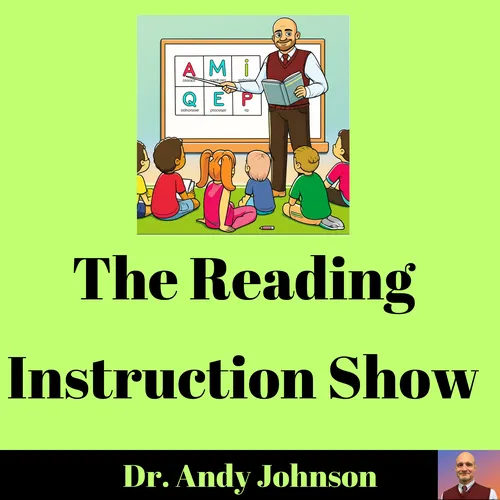
The Reading Instruction Show
The Reading Instruction Show is a podcast about reading instruction (and other things) with a little bit of attitude. There is plenty here to inform and entertain all. And, by the way, I'm not trying to sell any books. I don't have any curriculum or programs to market. I don't accept speaking fees. And, I don't ever want to be a consultant.
- Update frequency
- every 8 days
- Average duration
- 15 minutes
- Episodes
- 295
- Years Active
- 2019 - 2025

SIMPLE HOME READING TIPS FOR PARENTS
Parents are wondering how to handle reading at home during the COVID-19 or during the summer months. This podcast offers some simple tips.

SHARED READING FOR LARGE UNIT PHONICS
Large unit phonics is based on the brain’s natural inclination to notice patterns and complete configurations based on partial data. When we look at words on the page, we tend to notice letter patter…

PHONICS INSTRUCTION IN A MEANING-BASED APPROACH TO READING INSTRUCTION
There are three types of phonics instruction: synthetic phonics, analytic phonics, and large unit phonics. In a meaning-based approach to word work, they should all be included.

Scaffolded Oral Reading and Tips for the Language Experience Approach
This podcast described scaffolded oral reading (ScORe) and provided some tips for using the language experience approach.

THE LANGUAGE EXPERIENCE APPROACH
The language experience approach, or language experience activity, is a powerful strategy to use with struggling or beginning readers. Here readers practice reading using words and concepts within t…

READING FLUENCY: SHORT PASSAGE FLUENCY
This podcast describes a strategy to develop reading fluency for severely struggling readers, or any other readers reading at RL 1 or RL 2. The materials for this strategy can be found at www.Readoc…

READING FLUENCY: NO WCPM PLUS 2 STRATEGIES
WPM (words-per-minute) scores should be used to document reading fluency program NOT WCPM (words-correct-per-minute). This podcast explains why and describes two fluency strategies.

READING FLUENCY: NO ROUND ROBIN READING
Round robin reading is when a teacher goes around the reading table or class and asks students to read parts of a text out loud. This should never be used. This podcast describes 7 alternatives to …

READING FLUENCY: EXPRESSION AND PROSODY
This video podcast explains two terms related to reading fluency: expression and prosody. Reading with expression is not at all important. Reading prosody is.

FLUENCY: STANDARDIZED READING RATES
This podcast provides a brief overview of reading fluency and describes why standardized, norm-references words-per-minute (WPM) rates should be given limited attention.

UNDERSTANDING 8 ESSENTIAL TERMS RELATED TO READING INSTRUCTION
This podcast describes eight essential terms related to reading instruction that commonly misunderstood: 1. Reading, 2.word recognition, 3. word identification, 4. decoding, 5. a strategy, 6. a skill…

Three Big Ideas for Effective Reading Interventions
This podcast describes the three big ideas related to effective reading interventions: 1. They should be more intense versions of good classroom reading instruction, 2 they should contain a balanced …

Updated: 7 Elements necessary for Effective Daily Reading Instruction
This podcast describes the seven elements necessary for effective daily reading instruction: 1. Daily reading practice, 2. social interaction and conversation around good books, 3. authentic writing …

Reluctant Writers
What do you do when you have a student who refuses to write. This short podcast provides some tips.

Two Theoretical Models of Reading
Educational research is used to create the theories upon which we design educational policies and practices. Theories help to organize relevant empirical facts (empirical means they can be observed o…